The Role of Activism and Slacktivism in Modern Political Science
VerifiedAdded on 2022/08/29
|6
|1441
|17
Essay
AI Summary
This essay provides a comprehensive analysis of political activism and slacktivism, exploring the roles and impact of each within society. It defines activism as efforts to bring about change, contrasting it with slacktivism, which is primarily online engagement. The essay examines the actions and motivations of both activists and slacktivists, using real-world examples to illustrate the differences between direct action and online support. It delves into the effectiveness of each approach, the impact on political and social change, and the importance of distinguishing between genuine commitment and superficial involvement. The essay concludes by evaluating a specific case study of a radio host, assessing their actions and determining whether they align with the principles of true activism or reflect a more self-serving or ineffective approach. The essay also references the work of various authors to support arguments.
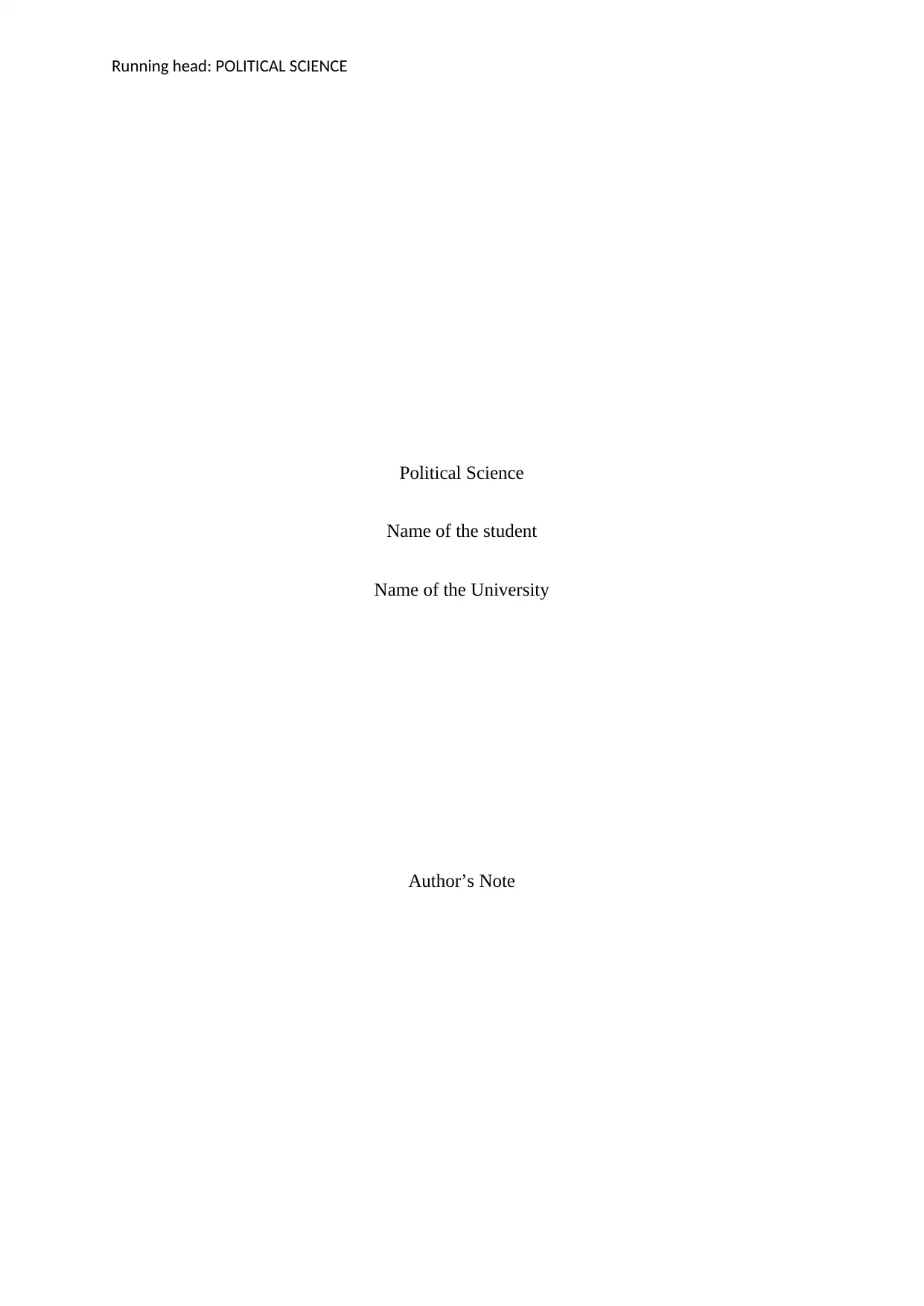
Running head: POLITICAL SCIENCE
Political Science
Name of the student
Name of the University
Author’s Note
Political Science
Name of the student
Name of the University
Author’s Note
Paraphrase This Document
Need a fresh take? Get an instant paraphrase of this document with our AI Paraphraser
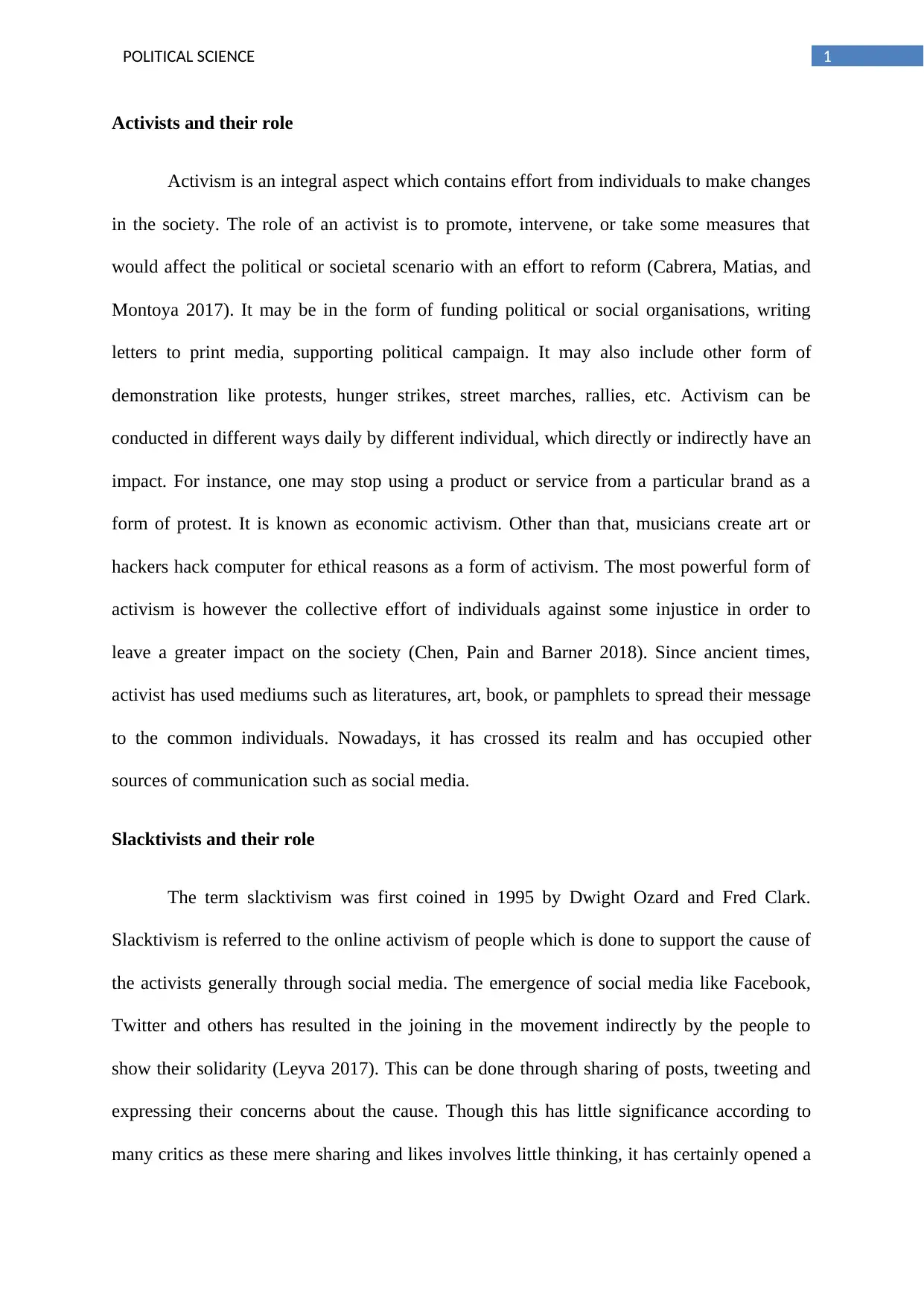
1POLITICAL SCIENCE
Activists and their role
Activism is an integral aspect which contains effort from individuals to make changes
in the society. The role of an activist is to promote, intervene, or take some measures that
would affect the political or societal scenario with an effort to reform (Cabrera, Matias, and
Montoya 2017). It may be in the form of funding political or social organisations, writing
letters to print media, supporting political campaign. It may also include other form of
demonstration like protests, hunger strikes, street marches, rallies, etc. Activism can be
conducted in different ways daily by different individual, which directly or indirectly have an
impact. For instance, one may stop using a product or service from a particular brand as a
form of protest. It is known as economic activism. Other than that, musicians create art or
hackers hack computer for ethical reasons as a form of activism. The most powerful form of
activism is however the collective effort of individuals against some injustice in order to
leave a greater impact on the society (Chen, Pain and Barner 2018). Since ancient times,
activist has used mediums such as literatures, art, book, or pamphlets to spread their message
to the common individuals. Nowadays, it has crossed its realm and has occupied other
sources of communication such as social media.
Slacktivists and their role
The term slacktivism was first coined in 1995 by Dwight Ozard and Fred Clark.
Slacktivism is referred to the online activism of people which is done to support the cause of
the activists generally through social media. The emergence of social media like Facebook,
Twitter and others has resulted in the joining in the movement indirectly by the people to
show their solidarity (Leyva 2017). This can be done through sharing of posts, tweeting and
expressing their concerns about the cause. Though this has little significance according to
many critics as these mere sharing and likes involves little thinking, it has certainly opened a
Activists and their role
Activism is an integral aspect which contains effort from individuals to make changes
in the society. The role of an activist is to promote, intervene, or take some measures that
would affect the political or societal scenario with an effort to reform (Cabrera, Matias, and
Montoya 2017). It may be in the form of funding political or social organisations, writing
letters to print media, supporting political campaign. It may also include other form of
demonstration like protests, hunger strikes, street marches, rallies, etc. Activism can be
conducted in different ways daily by different individual, which directly or indirectly have an
impact. For instance, one may stop using a product or service from a particular brand as a
form of protest. It is known as economic activism. Other than that, musicians create art or
hackers hack computer for ethical reasons as a form of activism. The most powerful form of
activism is however the collective effort of individuals against some injustice in order to
leave a greater impact on the society (Chen, Pain and Barner 2018). Since ancient times,
activist has used mediums such as literatures, art, book, or pamphlets to spread their message
to the common individuals. Nowadays, it has crossed its realm and has occupied other
sources of communication such as social media.
Slacktivists and their role
The term slacktivism was first coined in 1995 by Dwight Ozard and Fred Clark.
Slacktivism is referred to the online activism of people which is done to support the cause of
the activists generally through social media. The emergence of social media like Facebook,
Twitter and others has resulted in the joining in the movement indirectly by the people to
show their solidarity (Leyva 2017). This can be done through sharing of posts, tweeting and
expressing their concerns about the cause. Though this has little significance according to
many critics as these mere sharing and likes involves little thinking, it has certainly opened a
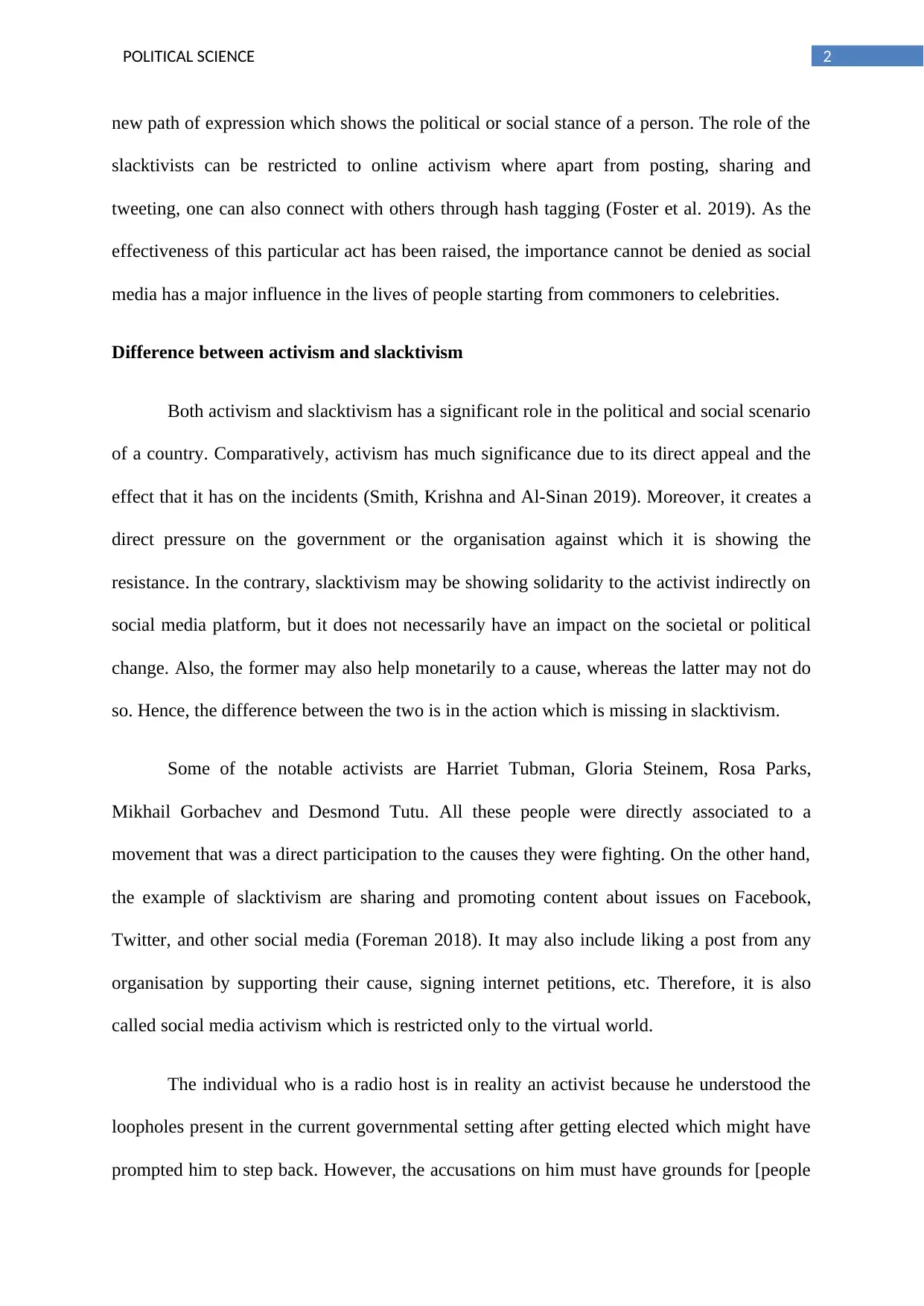
2POLITICAL SCIENCE
new path of expression which shows the political or social stance of a person. The role of the
slacktivists can be restricted to online activism where apart from posting, sharing and
tweeting, one can also connect with others through hash tagging (Foster et al. 2019). As the
effectiveness of this particular act has been raised, the importance cannot be denied as social
media has a major influence in the lives of people starting from commoners to celebrities.
Difference between activism and slacktivism
Both activism and slacktivism has a significant role in the political and social scenario
of a country. Comparatively, activism has much significance due to its direct appeal and the
effect that it has on the incidents (Smith, Krishna and Al-Sinan 2019). Moreover, it creates a
direct pressure on the government or the organisation against which it is showing the
resistance. In the contrary, slacktivism may be showing solidarity to the activist indirectly on
social media platform, but it does not necessarily have an impact on the societal or political
change. Also, the former may also help monetarily to a cause, whereas the latter may not do
so. Hence, the difference between the two is in the action which is missing in slacktivism.
Some of the notable activists are Harriet Tubman, Gloria Steinem, Rosa Parks,
Mikhail Gorbachev and Desmond Tutu. All these people were directly associated to a
movement that was a direct participation to the causes they were fighting. On the other hand,
the example of slacktivism are sharing and promoting content about issues on Facebook,
Twitter, and other social media (Foreman 2018). It may also include liking a post from any
organisation by supporting their cause, signing internet petitions, etc. Therefore, it is also
called social media activism which is restricted only to the virtual world.
The individual who is a radio host is in reality an activist because he understood the
loopholes present in the current governmental setting after getting elected which might have
prompted him to step back. However, the accusations on him must have grounds for [people
new path of expression which shows the political or social stance of a person. The role of the
slacktivists can be restricted to online activism where apart from posting, sharing and
tweeting, one can also connect with others through hash tagging (Foster et al. 2019). As the
effectiveness of this particular act has been raised, the importance cannot be denied as social
media has a major influence in the lives of people starting from commoners to celebrities.
Difference between activism and slacktivism
Both activism and slacktivism has a significant role in the political and social scenario
of a country. Comparatively, activism has much significance due to its direct appeal and the
effect that it has on the incidents (Smith, Krishna and Al-Sinan 2019). Moreover, it creates a
direct pressure on the government or the organisation against which it is showing the
resistance. In the contrary, slacktivism may be showing solidarity to the activist indirectly on
social media platform, but it does not necessarily have an impact on the societal or political
change. Also, the former may also help monetarily to a cause, whereas the latter may not do
so. Hence, the difference between the two is in the action which is missing in slacktivism.
Some of the notable activists are Harriet Tubman, Gloria Steinem, Rosa Parks,
Mikhail Gorbachev and Desmond Tutu. All these people were directly associated to a
movement that was a direct participation to the causes they were fighting. On the other hand,
the example of slacktivism are sharing and promoting content about issues on Facebook,
Twitter, and other social media (Foreman 2018). It may also include liking a post from any
organisation by supporting their cause, signing internet petitions, etc. Therefore, it is also
called social media activism which is restricted only to the virtual world.
The individual who is a radio host is in reality an activist because he understood the
loopholes present in the current governmental setting after getting elected which might have
prompted him to step back. However, the accusations on him must have grounds for [people
⊘ This is a preview!⊘
Do you want full access?
Subscribe today to unlock all pages.

Trusted by 1+ million students worldwide
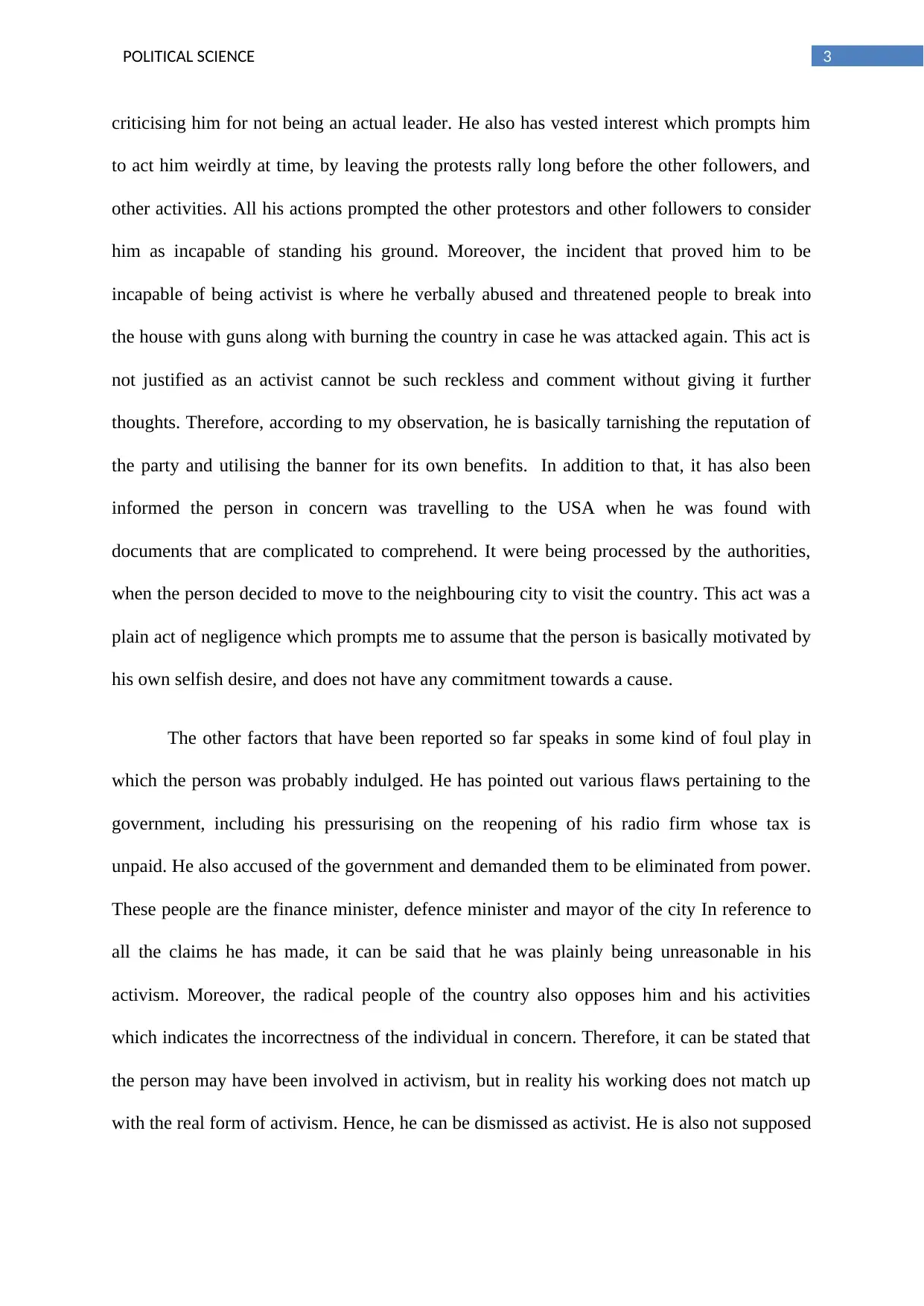
3POLITICAL SCIENCE
criticising him for not being an actual leader. He also has vested interest which prompts him
to act him weirdly at time, by leaving the protests rally long before the other followers, and
other activities. All his actions prompted the other protestors and other followers to consider
him as incapable of standing his ground. Moreover, the incident that proved him to be
incapable of being activist is where he verbally abused and threatened people to break into
the house with guns along with burning the country in case he was attacked again. This act is
not justified as an activist cannot be such reckless and comment without giving it further
thoughts. Therefore, according to my observation, he is basically tarnishing the reputation of
the party and utilising the banner for its own benefits. In addition to that, it has also been
informed the person in concern was travelling to the USA when he was found with
documents that are complicated to comprehend. It were being processed by the authorities,
when the person decided to move to the neighbouring city to visit the country. This act was a
plain act of negligence which prompts me to assume that the person is basically motivated by
his own selfish desire, and does not have any commitment towards a cause.
The other factors that have been reported so far speaks in some kind of foul play in
which the person was probably indulged. He has pointed out various flaws pertaining to the
government, including his pressurising on the reopening of his radio firm whose tax is
unpaid. He also accused of the government and demanded them to be eliminated from power.
These people are the finance minister, defence minister and mayor of the city In reference to
all the claims he has made, it can be said that he was plainly being unreasonable in his
activism. Moreover, the radical people of the country also opposes him and his activities
which indicates the incorrectness of the individual in concern. Therefore, it can be stated that
the person may have been involved in activism, but in reality his working does not match up
with the real form of activism. Hence, he can be dismissed as activist. He is also not supposed
criticising him for not being an actual leader. He also has vested interest which prompts him
to act him weirdly at time, by leaving the protests rally long before the other followers, and
other activities. All his actions prompted the other protestors and other followers to consider
him as incapable of standing his ground. Moreover, the incident that proved him to be
incapable of being activist is where he verbally abused and threatened people to break into
the house with guns along with burning the country in case he was attacked again. This act is
not justified as an activist cannot be such reckless and comment without giving it further
thoughts. Therefore, according to my observation, he is basically tarnishing the reputation of
the party and utilising the banner for its own benefits. In addition to that, it has also been
informed the person in concern was travelling to the USA when he was found with
documents that are complicated to comprehend. It were being processed by the authorities,
when the person decided to move to the neighbouring city to visit the country. This act was a
plain act of negligence which prompts me to assume that the person is basically motivated by
his own selfish desire, and does not have any commitment towards a cause.
The other factors that have been reported so far speaks in some kind of foul play in
which the person was probably indulged. He has pointed out various flaws pertaining to the
government, including his pressurising on the reopening of his radio firm whose tax is
unpaid. He also accused of the government and demanded them to be eliminated from power.
These people are the finance minister, defence minister and mayor of the city In reference to
all the claims he has made, it can be said that he was plainly being unreasonable in his
activism. Moreover, the radical people of the country also opposes him and his activities
which indicates the incorrectness of the individual in concern. Therefore, it can be stated that
the person may have been involved in activism, but in reality his working does not match up
with the real form of activism. Hence, he can be dismissed as activist. He is also not supposed
Paraphrase This Document
Need a fresh take? Get an instant paraphrase of this document with our AI Paraphraser
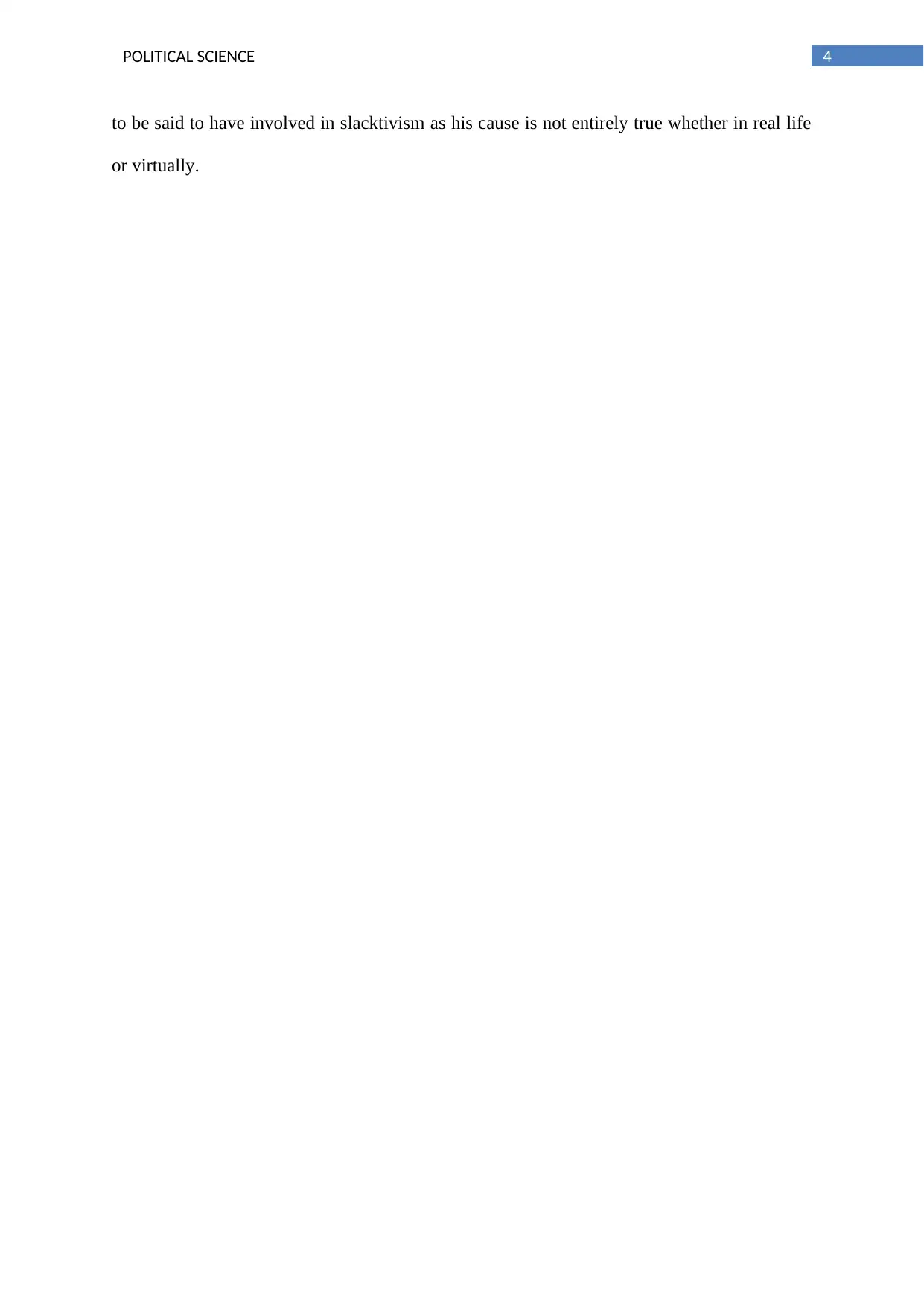
4POLITICAL SCIENCE
to be said to have involved in slacktivism as his cause is not entirely true whether in real life
or virtually.
to be said to have involved in slacktivism as his cause is not entirely true whether in real life
or virtually.
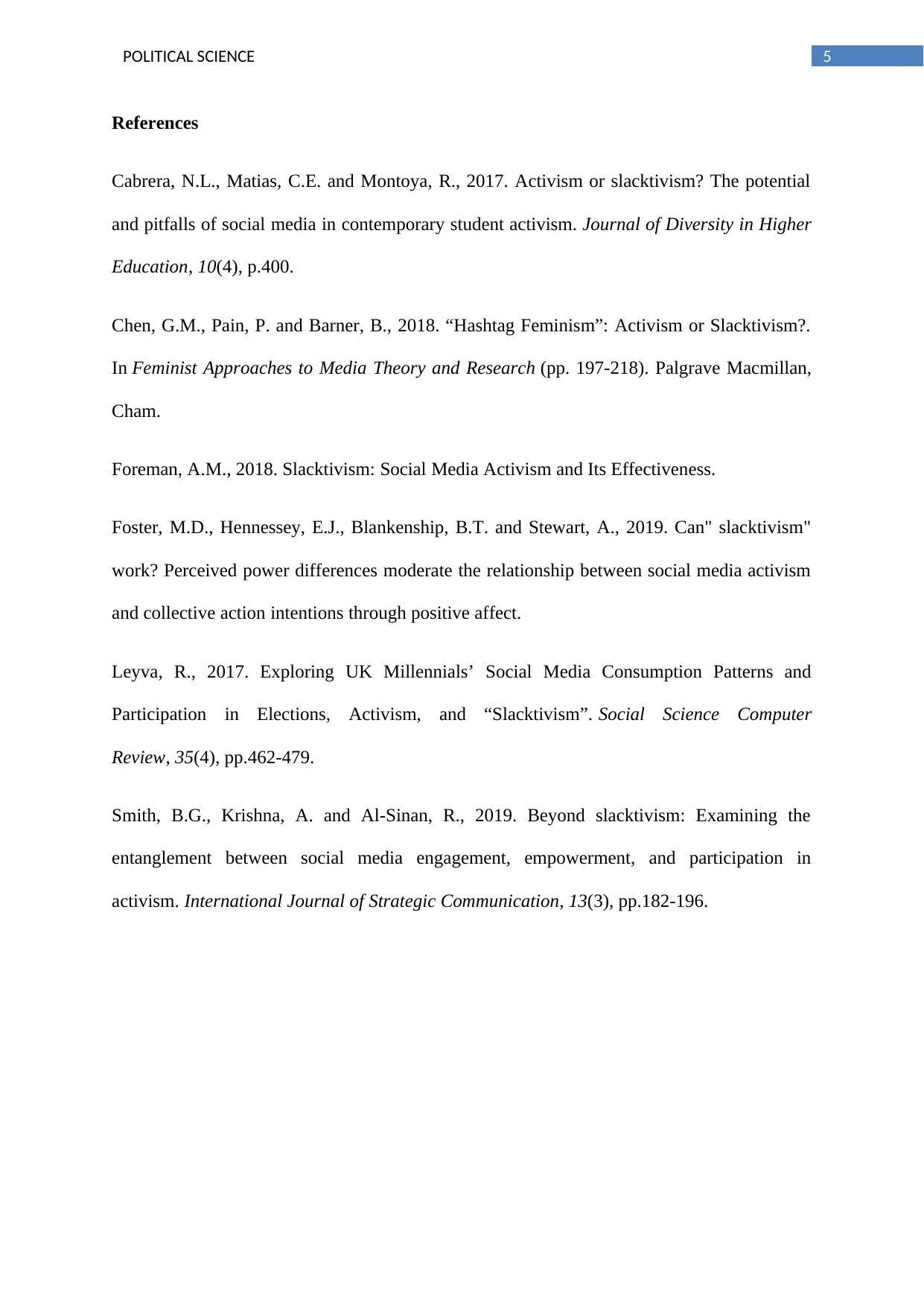
5POLITICAL SCIENCE
References
Cabrera, N.L., Matias, C.E. and Montoya, R., 2017. Activism or slacktivism? The potential
and pitfalls of social media in contemporary student activism. Journal of Diversity in Higher
Education, 10(4), p.400.
Chen, G.M., Pain, P. and Barner, B., 2018. “Hashtag Feminism”: Activism or Slacktivism?.
In Feminist Approaches to Media Theory and Research (pp. 197-218). Palgrave Macmillan,
Cham.
Foreman, A.M., 2018. Slacktivism: Social Media Activism and Its Effectiveness.
Foster, M.D., Hennessey, E.J., Blankenship, B.T. and Stewart, A., 2019. Can" slacktivism"
work? Perceived power differences moderate the relationship between social media activism
and collective action intentions through positive affect.
Leyva, R., 2017. Exploring UK Millennials’ Social Media Consumption Patterns and
Participation in Elections, Activism, and “Slacktivism”. Social Science Computer
Review, 35(4), pp.462-479.
Smith, B.G., Krishna, A. and Al-Sinan, R., 2019. Beyond slacktivism: Examining the
entanglement between social media engagement, empowerment, and participation in
activism. International Journal of Strategic Communication, 13(3), pp.182-196.
References
Cabrera, N.L., Matias, C.E. and Montoya, R., 2017. Activism or slacktivism? The potential
and pitfalls of social media in contemporary student activism. Journal of Diversity in Higher
Education, 10(4), p.400.
Chen, G.M., Pain, P. and Barner, B., 2018. “Hashtag Feminism”: Activism or Slacktivism?.
In Feminist Approaches to Media Theory and Research (pp. 197-218). Palgrave Macmillan,
Cham.
Foreman, A.M., 2018. Slacktivism: Social Media Activism and Its Effectiveness.
Foster, M.D., Hennessey, E.J., Blankenship, B.T. and Stewart, A., 2019. Can" slacktivism"
work? Perceived power differences moderate the relationship between social media activism
and collective action intentions through positive affect.
Leyva, R., 2017. Exploring UK Millennials’ Social Media Consumption Patterns and
Participation in Elections, Activism, and “Slacktivism”. Social Science Computer
Review, 35(4), pp.462-479.
Smith, B.G., Krishna, A. and Al-Sinan, R., 2019. Beyond slacktivism: Examining the
entanglement between social media engagement, empowerment, and participation in
activism. International Journal of Strategic Communication, 13(3), pp.182-196.
⊘ This is a preview!⊘
Do you want full access?
Subscribe today to unlock all pages.

Trusted by 1+ million students worldwide
1 out of 6
Related Documents
Your All-in-One AI-Powered Toolkit for Academic Success.
+13062052269
info@desklib.com
Available 24*7 on WhatsApp / Email
![[object Object]](/_next/static/media/star-bottom.7253800d.svg)
Unlock your academic potential
Copyright © 2020–2026 A2Z Services. All Rights Reserved. Developed and managed by ZUCOL.





